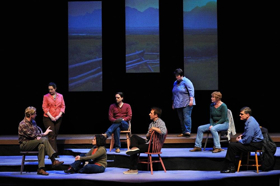Review: THE LARAMIE PROJECT at 20 YEARS: Still Powerful

Theatre, at its best, can entertain you so much you forget all your troubles for a blissful two hours before remembering your dental appointment the next day. It can also cause you to delve deeply into questions about life, human nature and the gut-wrenching misery that human beings can visit upon one another. The Laramie Project eloquently, painfully and painstakingly belongs in the latter category. The powerful drama, as the Palo Alto Players' press release tells us, was originally developed by playwright Moisés Kaufman and members of his company, Tectonic Theater Project in the aftermath of the 1998 murder of Matthew Shepard, a 21-year-old gay student at the University of Wyoming. Twenty years later it is still as powerful as ever.
What happens when a small Wyoming university town suddenly becomes the epicenter of a worldwide media storm? How do the locals react to an incomprehensible murder committed by two of their own and what is the impact on their individual and corporate lives? This is what Kaufman and members of his 'Tectonic' company set out to discover. In all, they conducted over 200 interviews with local Laramie residents, and those interviews form the basis for The Laramie Project.
As the play begins, eight local and wonderfully talented Bay Area artists for this Palo Alto Players production, begin to take the stage. They play the parts of the 'Tectonic' company, as well as over 60 Laramie residents. That's a lot of characters and sometimes it's hard to tell which part each one is playing. More consistent -- as well as distinct costuming -- would have helped the audience distinguish between them. They all speak directly to the audience, and slowly we get a feel for the small town; it's professionals, students, and locals as well as the 'Tectonic' members who interviewed them. The cast is cohesive and strong and director Lee Ann Payne's instincts for dramatic nuance pay off, giving the audience a memorable and ultimately, compassionate portrayal of the Laramie community.
Projections Designer Nikolaj Sorensen provides a tryptic of small screens that serve as the backdrop to the show. Wyoming's rugged Great Plains starkly contrast the snowy Rocky Mountain peaks covered in pines in the windswept town of Laramie. The inside of a local bar, a church altar, the night sky spilling starlight and the rough-hewn fence where Matthew was left to die are all depicted, but the effect is subtle, giving us mere glimpses - as if Sorensen knew the audience could only handle so much reality.
One-by-one the townspeople tell us their tragic, heroic and stunned stories. The simple tiered set (again Nikolaj Sorensen) serves to put the actors front and center in bold relief. There is no escaping the ragged edges of their words and the torment in their voices. How could this happen in Laramie, they all ask to varying degrees. Initial reactions roil with shock, rage, and disbelief. For many, homophobia rears its ugly head. For others, the attack on Matthew is met with compassion and community bonding at candlelight vigils.
We "meet" Matthew through the witness of others. Aaron Kreifels (played with great sensitivity by Roneet Aliza Rahamim) is the stunned young student who happened upon Matthew while bicycling along an unfamiliar path. He wonders why God would have taken him out there on that day. Officer Reggie Fluty (a shaken but stalwart Dana Cordelia Morgan) is the first officer to respond to the call, who, together with her mother, Marge Murray (lovingly played by Judith Miller) must contend with the possibility of having contracted the HIV virus from Matthew.
Matthew's homosexuality is addressed by the religious leaders in town. The Unitarian Minister (Jeff Clarke injects some of the only humor in the show) educates the audience on the spectrum of religious sentiments of his fellow preachers. Predictably (at least for that time) the Baptist and Mormon preachers remonstrate against Matthew's homosexuality. But it is the Catholic priest (Todd Wright is memorable) who bravely holds the first vigil for Matthew.
As we progress through the funeral and the trial of Matthew's killers, an out-of-town preacher arrives. He, along with some of his flock, have come solely to spew their homophobic hatred on the hurting community of Laramie. Reverend Phelps's vitriol galvanizes Matthew's friend, Romaine Patterson (again, the wonderfully talented Roneet Aliza Rahamim), who hatches a plan to meet his hatred with "a message of peace and love and compassion." It's a moving moment in the play, underscoring the idea that, no matter how horrific the event, love can bring healing.
A word or two about the Palo Alto Players. They've been in existence for eighty-seven years and their mission is to provide a "meaningful theatre experience for both audience and production participants." They hold that "...theatre benefits the community-at-large and enhances the quality of life of those who are touched by it through education, enlightenment and enrichment." Surely Artistic Director Patrick Klein had this in mind in his undertaking of The Laramie Project. When you go to see the show (and I do recommend that you go), please add your thoughts to their "Wall of Kindness," located in the lobby. In doing so, you help mitigate the homophobia, that, in today's political climate, is still rearing its ugly head.
THE LARAMIE PROJECT
By Moisés Kaufman and the members of Tectonic Theater Project
Directed by Lee Ann Payne
The Palo Alto Players
Playing Now Through February 4, 2018
www.paplayers.org
Photo courtesy of Joyce Goldschmid
Reader Reviews

Videos

